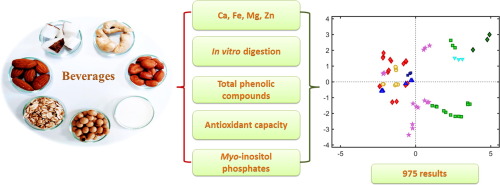Food Research International ( IF 8.1 ) Pub Date : 2020-01-10 , DOI: 10.1016/j.foodres.2020.108993 Joyce Grazielle Siqueira Silva , Ana Paula Rebellato , Elem Tamirys dos Santos Caramês , Ralf Greiner , Juliana Azevedo Lima Pallone

|
Consumption of plant-based beverages (PBB) is a growing trend; and have been used as viable substitutes for dairy based products. To date, no study has comparatively analyzed mineral composition and effect of in vitro digestion on the bioaccessibility of different PBB. The aim of this research was to investigate the content of essential minerals (calcium (Ca), magnesium (Mg), iron (Fe), zinc (Zn)) and to estimate the effect of in vitro digestion in plant-based beverages, and their antioxidant bioactive compounds (phenolic compounds and antioxidant capacity). Moreover, the presence of antinutritional factors, such as myo-inositol phosphates fractions, were evaluated. Samples of PBB (rice, cashew nut, almond, peanut, coconut, oat, soy, blended or not with another ingredients, fortified with minerals or naturally present) and milk for comparison were evaluated. TPC ranged from 0.2 mg GAEq/L for coconut to 12.4 mg GAEq/L for rice and, the antioxidant capacity (DPPH) ranged from 3.1 to 306.5 µmol TE/L for samples containing peanut and oat, respectively. Only a few samples presented myo-inositol phosphates fractions in their composition, mostly IP5 and IP6, especially cashew nut beverages. Mineral content showed a wide range for Ca, ranging from 10 to 1697.33 mg/L for rice and coconut, respectively. The Mg content ranged from 6.29 to 251.23-268.43 mg/L for rice and cashew nut beverages, respectively. Fe content ranged from 0.76 mg/L to 12.89 mg/L for the samples of rice. Zinc content ranged from 0.57 mg/L to 8.13 mg/L for samples of oat and soy, respectively. Significant variation was observed for Ca (8.2-306.6 mg/L) and Mg (1.9-107.4 mg/L) dialyzed between the beverages, with lower concentrations of Fe (1.0 mg/L) and Zn (0.5 mg/L) in dialyzed fractions. This study provides at least 975 analytically determined laboratory results, providing important information for characterization and comparison of different plant-based beverages.
中文翻译:

体外消化对植物性饮料矿物质生物可及性和抗氧化生物活性化合物的影响
植物性饮料(PBB)的消费量正在增长。并已被用作乳制品的可行替代品。迄今为止,还没有研究比较分析矿物质的组成和体外消化对不同PBB生物可及性的影响。这项研究的目的是研究必需矿物质(钙(Ca),镁(Mg),铁(Fe),锌(Zn))的含量,并评估植物性饮料在体外的消化作用,以及它们的抗氧化生物活性化合物(酚类化合物和抗氧化能力)。而且,存在抗营养因子,例如肌评估了肌醇磷酸酯级分。评估了多溴联苯(大米,腰果,杏仁,花生,椰子,燕麦,大豆,是否掺有其他成分,掺有矿物质或天然存在)和牛奶的样品,以进行比较。TPC的范围从椰子的0.2 mg GAEq / L到大米的12.4 mg GAEq / L,对于含花生和燕麦的样品,其抗氧化能力(DPPH)分别从3.1到306.5 µmol TE / L。仅有少数样本呈肌样-肌醇磷酸酯在其组成中的馏分,大部分为IP5和IP6,尤其是腰果饮料。钙的矿物质含量范围很广,大米和椰子的矿物质含量分别为10至1697.33 mg / L。大米和腰果饮料的镁含量分别为6.29至251.23-268.43 mg / L。大米样品中的铁含量范围为0.76 mg / L至12.89 mg / L。燕麦和大豆样品的锌含量分别为0.57 mg / L至8.13 mg / L。两种饮料之间渗析的Ca(8.2-306.6 mg / L)和Mg(1.9-107.4 mg / L)观察到显着变化,渗析的Fe(1.0 mg / L)和Zn(0.5 mg / L)浓度较低分数。这项研究至少提供了975个分析确定的实验室结果,


























 京公网安备 11010802027423号
京公网安备 11010802027423号